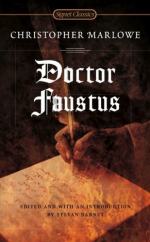|
This section contains 8,193 words (approx. 28 pages at 300 words per page) |

|
SOURCE: "Skepticism and Solipsism in Dr. Faustus," in Research Opportunities in Renaissance Drama, edited by David M. Bergeron, Vol. XXXVI, University of Kansas, 1997, pp. 1-22.
In the following essay, Hamlin disputes the modern critical tendency to interpret Doctor Faustus as either supportive or subversive with regard to the societal and especially religious orthodoxy of Marlowe's time. Hamlin declares that commentators are wrong to focus their analysis of the play on whtether it is "orthodox or heterodox, Christian or Diabolonian, homiletic or iconoclastic … liberal humanist or predestinarian," instead contending that this play explores these positions without conclusively supporting any of them.
Twentieth-century criticism of Christopher Marlowe's Doctor Faustus has produced not only a substantial number of polarized and mutually-exclusive interpretations but also a broad array of intermediate views and divided responses. Readings of the play have been variously characterized as either orthodox or heterodox, Christian or Diabolonian, homiletic or...
|
This section contains 8,193 words (approx. 28 pages at 300 words per page) |

|


